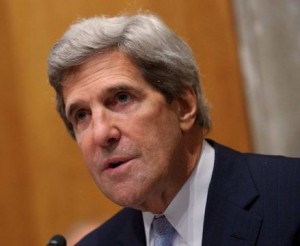 This time will be different. That is the word from U.S. �Secretary of State�John Kerry�to Syrian rebels who have become so frustrated by empty promises of help to overthrow President�Bashar Assad�that they had threatened to boycott a Thursday meeting in�Rome�of the Friends of Syria alliance.
This time will be different. That is the word from U.S. �Secretary of State�John Kerry�to Syrian rebels who have become so frustrated by empty promises of help to overthrow President�Bashar Assad�that they had threatened to boycott a Thursday meeting in�Rome�of the Friends of Syria alliance.Hints of meaningful assistance remain vague, though, giving rise to fear of more dashed expectations.
�We are not coming to Rome simply to talk, we are coming to Rome to talk about next steps,��Kerry told reporters in London after meeting with his British counterpart, Foreign Secretary�William Hague.
His inaugural overseas foray as the U.S. chief diplomat has been designed �precisely to consult with our friends and allies� on Syria, Kerry asserted, noting the first two days of his nine-state diplomatic scurry have included huddles with British, German, French and Russian colleagues.
Some Syrian experts warn that �another failure on the part of Washington to come to the embattled Syrian people�s rescue could irreparably undermine U.S. credibility. It could also embolden Assad to press on with a murderous campaign that has already killed about 70,000 people, drive rebels fighting for democracy into the arms of Islamic extremists and create what�the Economist�called �a new Somalia rotting in the heart of the Levant.�
But for all that is at stake after two years of bloody fratricide, the United States has other vital foreign policy objectives that could dissuade it from bold action. The Rome talks coincide with the resumption of negotiations on�Iran�s nuclear ambitions that convened Tuesday in Kazakhstan after an eight-month hiatus, and Washington must maintain civil relations with�Moscow�-- Syria�s key ally -- if it wants to withdraw troops from�Afghanistan�via Russian territory over the next two years.
If the Obama administration were to supply the rebels with antiaircraft guns and other heavy weapons to shift the balance of power against Assad, �that would cross a red line and have a negative effect on the Iran nuclear talks,� said Bilal Y. Saab, director of the Washington office of the Institute for Near East and Gulf Military Analysis, a United Arab Emirates think tank.
Averting a nuclear-armed Iran is Washington�s No. 1 foreign policy priority, Saab said, and boosting the U.S. economy trumps all administration objectives.
�American public sentiment is for no more wars in the Middle East, no more interventions, because we have our own problems,� he said of the disincentives for providing massive financial aid to the rebels.
The U.S. government �also needs to keep its options open in withdrawing its 66,000 troops from Afghanistan, noted Daniel Serwer, a former�State Department�official in conflict management now at Johns Hopkins School of Advanced International Studies.
Washington has been hesitant to provide more than humanitarian aid and logistical assistance to the rebels for fear of weapons falling into the hands of Islamic extremists fighting alongside the disparate opposition and of alienating Moscow, Serwer said.
�The Russians control one of the major routes for American withdrawal from Afghanistan, the northern supply route� that wends its way from Kabul through the Salang Tunnel into the former Soviet republics of Central Asia, he said. Departing equipment convoys can reach allied European ports from there by road or rail through Western Russia -- as long as Moscow is of a mind to facilitate their passage.
Serwer sees missed opportunities for Washington to have come to the rebels� aid with political and humanitarian assistance and urges the government to make a course correction at the Rome meeting.
�It�s my hope that we�re getting ready to put down some hard cash for this coalition so it can start governing in the liberated areas in a meaningful way,� he said, referring to the Syrian National Coalition formed in November and tasked with naming a shadow government.
Some analysts point to recent reports of anti-tank weapons flowing to the rebels from Jordan as evidence that the United States is either clandestinely providing more powerful arms through its allies or looking the other way when the heavy guns are ferried in by supporters from sympathetic Sunni Muslims in the Persian Gulf states.
�I think it�s a U.S.-Jordanian-Saudi operation -- the same three groups that have worked together in the past trying to overthrow Saddam Hussein,� David Ottaway of the�Woodrow Wilson�International Center for Scholars said of intelligence and�media reports�of heavy weapons supplied to the rebels. �I do not think Jordan would be doing this on its own.�
Murhaf Jouejati, a strategic studies professor at the National Defense University and former advisor on Syria to the European Commission, sees steady progress by rebel fighters in seizing Syrian security installations and regime weapons.
�I don�t see a stalemate. The opposition, despite its meager resources, is gaining ground on a daily basis,� Jouejati said.
But the rebel advances are vulnerable to reversal without reliable U.S. aid and guidance in setting up a government that outside powers can deal with instead of Assad�s teetering regime, the Syrian-born academic cautioned.
�Mr. Kerry is in a difficult position. We all understand this,� Jouejati said. �But I just hope he doesn�t raise expectations again and then not fulfill them. This would be a tremendous mistake for the United States that would truly tarnish its image.�
By Los Angeles Times
The Iran Project is not responsible for the content of quoted articles.










